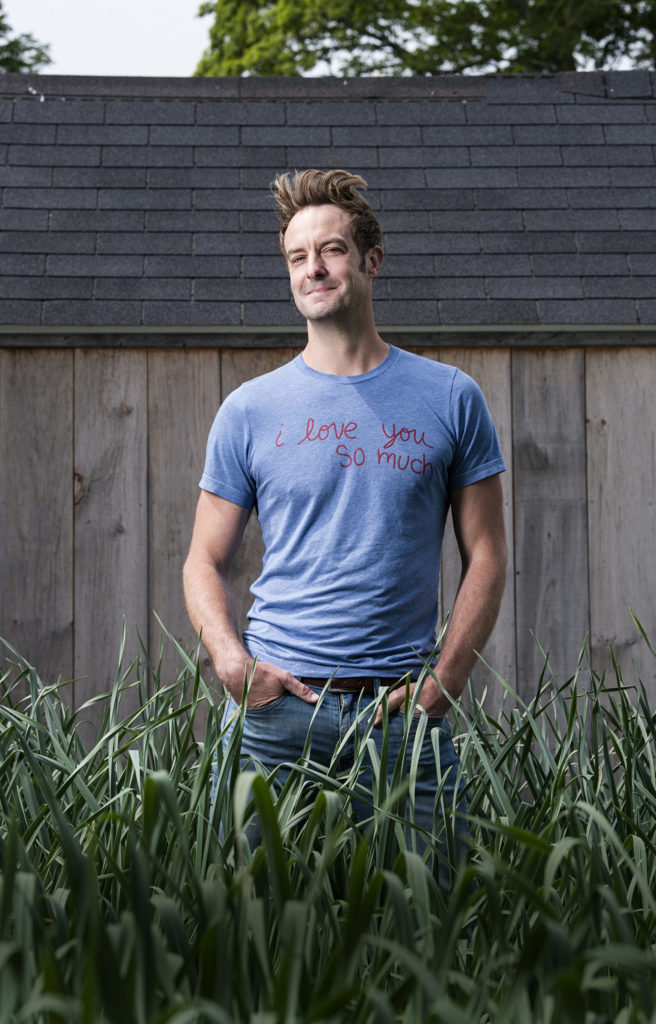Meet the Cookbook Author Who Wants to Put Fish on Your Plate
Former chef Barton Seaver talks about the barriers to people eating more seafood and why Maine should embrace aquaculture.

Meet the Cookbook Author Who Wants to Put Fish on Your Plate
Former chef Barton Seaver talks about the barriers to people eating more seafood and why Maine should embrace aquaculture.
Photography by Nicole Wolf
by Paul Koenig
Through career waypoints that have spanned from acclaimed Washington D.C. chef to National Geographic fellow to sustainable seafood advocate to cookbook author, Barton Seaver has remained consistent in his mission: encouraging people to eat seafood. At the South Freeport home he shares with his wife and their two kids, Seaver practices what he preaches: he eats seafood for lunch and dinner most days of the week. Through his writing and advocacy, he wants to normalize fish as an everyday protein like beef or chicken, and his 2019 book, The Joy of Seafood, included more than 900 recipes to get seafood on more plates. “When America increases our per capita consumption of seafood, everyone will win,” Seaver says, “except maybe the beef farmers.”
What are the primary roadblocks to getting more people to eat seafood?
Some of it is just legacy bias that I hear all the time. “Seafood makes my house smell.” Well, any cooking you do makes your house smell. There is the legacy bias against poor-quality seafood that by and large has been answered for. The vast majority of people now have access to very high-quality products, whether in the frozen case, the canned case, or the fresh case. There’s also just a lack of what I call seafood literacy. A home cook might be very comfortable cooking cod, but hake, oh, I don’t know. Well, it’s very similar. I would relate that to saying, “I know how to cook a ribeye, but I don’t know about strip steak.”
What about seafood made you want to devote your career to it?
Because it’s so damn interesting. From a chef’s perspective, from an eater’s perspective, there is no protein that brings us such seasonality, such diversity of flavors, taste, textures, colors. When we think about it from a cultural standpoint, seafood is America’s first heirloom or heritage food. It was the cod upon the backs of which we—white Americans—took our first steps onto these shores. There’s just so much inherent opportunity in seafood from a culinary perspective that’s just orders of magnitude above what’s offered to us by land animal proteins.
How did the way you approach and prepare seafood evolve when you went from being a chef to a home cook?
In my first book, For Cod and Country, it’s definitely a chef speaking to the reader. In my subsequent books, I learned to occupy the spiritual space and logistical space in my own home kitchen, and the recipes have gotten a lot less composed and far more functional, but the joy and creativity have not waned. I cook a lot of frozen fish. I cook a lot of fish in a toaster oven. I eat a lot of fish that I cooked yesterday, just because of life. Life and the reality of your day is an ingredient in whatever recipe you will ever cook, and there’s nothing you can do about it, so just learn how to incorporate it.
How does farmed fish and aquaculture fit into your goal of getting more people to eat seafood?
There is a longstanding debate about wild versus farmed that is front and center here in Maine, but I believe that is ultimately a false choice. The bottom line is we must have farmed seafood as part of a thriving human reality, and we must also have wild seafood. And Maine stands at the fore, in terms of our ability to do it right, to expand, to be the example. I equate Maine and her waters as the marine equivalent of what California’s Central Valley is to agriculture, and what it’s going to take is a radical reconceptualization of our relationship with the ocean. We see land as improved, as cultured, by our presence there—agriculture. We think of land as beautiful for our presence, but we largely think of the ocean as beautiful for our absence.
Why do you think Maine should embrace aquaculture and farmed seafood?
Because it offers us the chance to write our own future narrative. We are not just responsive to global changes or markets, but rather, we have in our power and capacity the chance to revolutionize those markets and our relationship and, in fact, resilience within the ecosystems. We’re talking about a new industry and the retention of culture and identity from heritage industries. And what I think is not often clear and what I think is not communicated is that the challenges faced by heritage and wild fisheries is in fact not aquaculture, but rather it’s a larger market that isn’t embracing seafood. Yeah, tilapia undercut cod. It sucked, and it really hurt a lot of fishermen, but you know what would have helped? Taking some of chicken’s market share. That would have helped a lot more than vilifying tilapia. Bottom line is we need both, so let’s make room for both.




